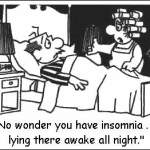
It’s 2am when I suddenly awoke from a rare but deep sleep, well, deep for me at least. Of course, I can’t simply fall right back asleep because now I have to use the bathroom.
I notice that I’m still pretty tired so I am telling myself to focus on this feeling instead of thinking about what I need to do the next day.
That pesky To Do list is lurking in the corner of my mind and doesn’t like to be put in time-out.
As soon as the fog lifts from my tired brain worry is front and center and plagues me for the next 2-3 hours.
A few nights of bad sleep have now turned into many years, so many that I can’t even remember when it started. It has become utterly agonizing at times.
If I am lucky I fall asleep around 5am and get another hour or two of sleep in, however, this means I won’t get a workout in because I am too tired to get out of bed.
Exercise is one key step in relieving anxiety and improving sleep and now I am again skipping something so vital to managing my own anxiety.
If this is your story, or something similar, I want you to know that you are not alone. I am right there with you.
I know all too well what it’s like to not get enough sleep night, after night, after night and how it affects the next day.
When I can’t sleep no matter how bright blue and sunny the Southern California sky is, and how warm and balmy the ocean air feels , everything looks grey and dull.
I obsess over when I will be done with what I’m doing so I can sneak in a nap.
There have been many, many days where I have even taken a nap in my car during my lunch break.
I have had to drive to quiet, hopefully deserted, but hopefully safe, parking lots just so I could get some sleep to make it through the rest of the day.
I can’t think clearly. I am not creative at all. I have no desire to make any decisions or try to do anything that requires concentration or forethought.
Everything I do feels like I have an extra 30 pounds of weight on me.
Lack of sleep can cause you to feel hopelessness, anger, frustration, sadness, irritability to the point that you are just sick and tired of trying to manage this gorilla on your back.
When I do get a good night’s sleep it’s amazing how wonderful life is. I feel like I can conquer the world. Everything is brighter and more colorful then usual.
I laugh and have fun. Life has a happy glow about it and I am motivated to do more, achieve more and accomplish my goals…until the evening descends…and I never know what to expect.
From the many clients I have had over the years the one thing I have witnessed over and over again is that change does not occur until you are REALLY, TRULY sick and tired of being who or how you are.
I’ve decided that it’s time to take charge of my insomnia rather than allowing it to control me. In my search for answers this is what I found:
Surprising (well surprising to me anyway) causes of Insomnia
- Cortisol
What is it? Cortisol is a hormone that is released when we are faced with a stressful event whether it be real or imaginary. Low levels of glucose in the blood also known as low blood sugar can increase cortisol levels as well.
One of the purposes of cortisol is to awaken us so we are ready to fight or flee the metaphorical tiger that is attacking us.
The problem with the insomniac is that they remain in a state of constant wakefulness because they don’t get the deep, restorative sleep necessary to bring cortisol levels back to normal.
Therefore, cortisol levels build up in the blood and keep the insomniac in a constant state of hyperarousal.
- Hyperarousal
What are the physical effects on your body? Cortisol, Norepinephrine and Epinephrine are released into the body to aid in the “fight or flight” response.
Norepinephrine raises the heart rate, which causes glucose to be released as energy and blood to flow to the muscles.
Epinephrine also raises the heart rate, constricts blood vessels, dilates pupils and suppresses the immune system.
Respiration is faster, blood pressure and levels of blood sugar are also increased. You are in a state of extreme alertness which means all of your senses are heightened. You are ready to fight.
When the stressful event has passed though, your body should be able to release these hormones and go back to normal, of course, this isn’t always the case.
If you are someone with chronic anxiety then you may be in state of hyperarousal most of your waking hours which makes it nearly impossible for your body to calm down and release these stress producing hormones.
- Low Blood Sugar
I would have to say that this was the most surprising fact I have recently discovered. According to an article written by Dr. Flannery the reason we wake up at 2am is due to low blood sugar levels.
Because our bodies are fasting throughout the night our blood sugar levels lower which kicks cortisol into gear to get those levels back to normal.
Now our bodies are in a heightened state of awareness which can jolt us awake.
- Thoughts are Things
Be mindful about sleep related thoughts. According to clinical Psychologist Steve Orma, author of “Stop Worrying and Get To Sleep” , how we perceive our sleep situation and the association we have with where we sleep (i.e. bed, bedroom) plays a huge part in getting a good night’s sleep.
At this point you are probably thinking, alright, I have a good idea about the effects of insomnia, but how do I overcome this obnoxious habit I have gotten myself in to?
Here are 9 steps you can take that may help relieve your state of fight or flight and get you back in balance.
#1. Take time each day to worry
I know…I know…this sounds crazy especially to an insomniac. Yet, giving yourself permission to worry actually provides some small sense of relief.
Have you heard of the cliche “Whatever you resist persists?” As anxious people we are prone to this and get into the habit of worrying about EVERYTHING.
Rather than fight it do something about it. Start with giving yourself permission to take 10 or 15 minutes a day to write down all of your worries.
When you do this two things happen, for one, when that worry starts to suck you can tell yourself that you have already over analyzed the thought and beat the hell out of it, so you can give yourself permission to let it go until the next day.
Two, in Psychology there’s this phrase “Prescribe the Problem.” The theory is that when you are given permission to act out the problem you get the opportunity to take control of it.
And once this happens you might just get bored of the problem behavior and dump it altogether.
#2. Take time to process your day
Worrying suppresses your ability to process what is going on in the moment.
This could be a major contributor to how or if we go to bed. I know for myself the end of the day is when I seem to run through my day and the next.
This might be because I can finally stop and relax which allows all my suppressed thoughts to pop into my mind.
Journaling is a simple, yet effective technique that lets your thoughts stream out of your head.
You are taking control of your thoughts rather than being run by them. You are probably thinking, I don’t have time to write down every negative thought and every situation that happened that day.
I hear ya! I am probably the busiest person you will meet (as my friends like to tell me).
But you can choose just one or two situations that caused you more anxiety then normal and write about those.
What happened? Why did that particular situation bother you? How can you resolve this issue and move on? Keep it basic.
#3. Plan out your day
This is a step that hands down works for me. I have been using this technique since undergrad. I start with the deadline, work my way back, and write in my calendar when I will begin working on a particular project.
I also write out the steps that I will take so that I know exactly what I need to do when the time comes.
This way I am not under pressure to figure out my best course of action.
Establishing deadlines and planning out my action steps gives me comfort by knowing that the task will be completed and I don’t have to obsess over it right now in this very moment.
#4. We are what we eat
I have tried almost all of these and eventually my body becomes immune to the remedy, however, I would rather keep trying the all-natural way then get to the point of popping pills every night.
Here are a list of foods, vitamins and herbal options that can help decrease cortisol levels and help increase sleep:
- Hard boiled eggs
- Turkey Meat
- Nut butters
- Bananas
- Multi-grain crackers and cheese
- Whole Grains
- Lentils
- Hummus
- Tuna or Salmon
- Tart Cherry Juice
- Omega 3
- B vitamins
- Calcium
- Magnesium (you can get this in a powder form and drink it as a tea)
- Valerian Root
- Chamomile tea
- Melatonin
- Power To Sleep PM by Irwin Naturals
#5. Exercise
Exercise is essential for the anxious person because it releases endorphins which act like morphine by diminishing the perception of pain.
They also work like a kind of natural sedative which will help you sleep better at night.
According to Steve Orma exercise elevates our body temperature. Afterwards our body temperature drops faster than normal which can also help you get to sleep.
I live by the beach and there are a series of stairs along the coast you can take to get to the sand.
I have noticed that after a 30-45 minute run on the beach and up and down a couple flights of stairs I am exhausted for the rest of the night.
Working out give me a sense of euphoria. My head feels clearer and I feel more motivated to get through my day.
#6. Hypnotherapy
I will keep this point brief and refer you to a Hypnotherapist I found on iTunes that has worked well for me.
You can try it out and see if it works for you. Glenn Harrold’s hypnotherapy session’s called “Relax,” “Inner Peace,” and “Wisdom” have helped me fall asleep fast and stay asleep.
In my experience as an anxious person having something to focus on other than my racing thoughts helps me calm down.
#7. Guided Meditations and White Noise
There are a number of guided meditation apps that I found via the App Store. Here are a few I have on my phone that have worked for me:
- SleepEasily (can also be found in Google Play)
- Insight Timer
- SleepStream
- SleepMachine
#8. Meditate
There is so much research out there about the benefits of meditation and it’s easy to find via the internet that I am not going to rehash it here. What I want to address is my own experience.
What I know is I have had high blood pressure for the last year which I have never had before and it doesn’t run in my family.
I believe this is largely due to insomnia and having an overabundance of cortisol levels in my blood.
For the anxious person sitting in a chair for more than 5 minutes trying to calm your thoughts can be agonizing until you really get good at it.
If this is the case for you here are some suggestions that have worked for me and my clients.
For some taking a walk is meditative. So is being creative such as dancing, cooking or crocheting/knitting (all three are my personal favorites).
Another idea is get some Mandala’s and crayons and act like that 5 year old you once were. Color away. Be creative.
These activities force your mind to focus on the present moment which stops your mind from racing and worrying about the past and future.
There is a quote I really like and it goes like this, “If you have one foot in the past and one foot in the future you are pissing on the present.”
Remember that when your thoughts get away from you.
#9. Stop fighting so hard
Probably one of the hardest things to do EVER. Accept that anxiety is something that must be managed just like managing your finances or your weight. It takes time, planning and practice.
Now I look at anxiety as something that is concrete and not abstract. As something that I must give energy to on a daily basis if I want to sleep better and lower my blood pressure.
Know that you are not alone. If anything you have Paul and I to support and guide you through this maddening condition.
There may be hope…what current research has to say
A Harvard neurologist, Patrick Fuller and his team, may have discovered an area of the lower brain stem that he calls the parafacial zone.
The lower brain’s main function is to be a highway sending signals to the upper brain and cerebellum.
Fuller and his team have found that this area could be triggered to rush Gaba to the upper brain. Gaba is a neurotransmitter that aids in sleeping and calms down our nervous system.
These findings are still in the very early stages but if this is the case scientists may be able to develop a drug that can help us insomniacs get into a deep sleep without the repercussions that many drugs.
Until these sleep aids are produced though, I hope that the tips and information here give you hope that you can wake up in the morning and feel energized rather then beat down and exhausted. I hope that you can conquer your insomnia and Get To Sleep.
To learn more about how to improve your sleep listen to this week’s episode of The Anxiety Guru Show. Paul spoke with clinical psychologist Dr. Steve Orma to get the details about better sleep.






This is a brilliant article, and having had sleep problems over the last 12 years (only just realised that I suffered from Insomnia) I can relate to most of what this article is saying.
I had no idea that it was low blood sugar that jolted you awake in the early hours (I must look into that…)
With regards to exercise, I highly recommend a form of H.I.I.T where you do short bursts of high exercise, for low periods of time (starting small, of course, like walking or running…the trick being to be out of breath). This allows a bigger release of Testosterone to be released, and also releases more Human Growth Hormone as well (I believe). Exercise is proven to help with stress/anxiety.
Keep up the good work. You’ve inspired me;-)
Julian,
Really like your tip regarding interval based work outs. It’s more intense but in my view more beneficial.
Thank you for this post Valerie and Paul. Some useful information for sure.
I’ve been using an app called DigiPill for both iOS and Android. I mostly use the anxiety and sleep ‘pills’. That app was the gateway into my recently started practice in meditation, which I am striving to do every day… So far so good.
Cheers!
Thank you Julian and Todd for the additional suggestions. Keep them coming! I love to hear what others are using out there. I am so glad this article was useful and inspiring to you!
I like your tips on the foods we could be eating to aid natural sleep, obviously i try to stay away from caffeine later in the day, and have a workout a few times a week but still have sleep trouble. I feel so panicked during the day with no sleep. I will knock up a few salads with your recommendations on ingredients .
thanks chris